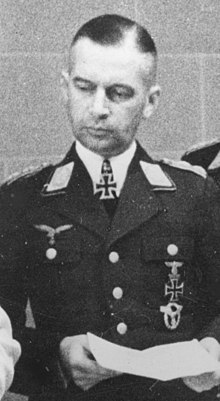
Back هانس چيستشونيك ARZ Ганс Ешанек Byelorussian Hans Jeschonnek Catalan Hans Jeschonnek German Hans Jeschonnek Spanish هانس یشونک Persian Hans Jeschonnek Finnish Hans Jeschonnek French הנס ישונק HE Hans Jeschonnek Italian
Hans Jeschonnek | |
|---|---|
 | |
| Born | 9 April 1899 Hohensalza, Posen |
| Died | 18 August 1943 (aged 44) Goldap, East Prussia |
| Allegiance | |
| Service/ | |
| Years of service | 1914–1943 |
| Rank | |
| Battles/wars | World War I Silesian Uprisings World War II |
| Awards | Knight's Cross of the Iron Cross |
| Relations | Gert Jeschonnek (brother) |
Hans Jeschonnek (9 April 1899 – 18 August 1943) was a German military aviator in the Luftstreitkräfte during World War I, a general staff officer in the Reichswehr in the inter–war period and Generaloberst (Colonel-General) and a Chief of the General Staff in the Luftwaffe, the aerial warfare branch of the Wehrmacht during World War II.
He was born in 1899 and joined the military as a cadet in 1909. Trained as an officer at a military academy, he was granted his commission in 1914 and served in the infantry on the Western Front. In 1916 he transferred to the Luftstreitkräfte and trained as a fighter pilot. Jeschonnek shot down two enemy aircraft by the time of the German defeat in November 1918, earning the Iron Cross 2nd and 1st class.
Jeschonnek remained in the military, joining the Reichswehr, the Weimar Republic armed forces. He fought in the Silesian Uprisings in 1919 and then served as a junior general staff officer in the 1920s. In 1933 the National Socialists seized power in Germany under the leadership of Adolf Hitler. Jeschonnek admired Hitler and under the leadership of his close associate Hermann Göring, commander-in-chief of the newly formed Luftwaffe, Jeschonnek's career began a meteoric rise from Hauptmann (Captain) in 1932 to Generalmajor (Brigadier General) in 1939. In November 1938 Jeschonnek was appointed chief of the general staff at just 39. Jeschonnek's rise depended, in part, on his slavish and unquestioning loyalty to Hitler and Göring.
Jeschonnek oriented the Luftwaffe away from the broadly based doctrines of the inter-war period upon the outbreak of World War II. He was a pupil of the short-term concept, the so-called Blitzkrieg war. Jeschonnek neglected industrial production, military intelligence, logistics, air defence, strategic bombing and the creation of reserves, the sustenance of a military organisation. Jeschonnek's way of war was based on the full commitment of the Luftwaffe to close air support operations in cooperation with the German Army.
The military victories, until 1942, largely masked the failures of Jeschonnek, Göring and the Oberkommando der Luftwaffe (High Command of the Air Force). As the German war effort failed on the Eastern and North African Fronts in 1942 and 1943, the British and American Combined Bomber Offensive began a strategy to destroy the Luftwaffe in a war of attrition for which Jeschonnek and Göring had failed to prepare.
In 1943, Jeschonnek experienced at least one emotional breakdown over the failures and the inability of the Luftwaffe to defend Germany. Undermined by Göring and his subordinates, Jeschonnek shot himself on 18 August 1943. The suicide was covered up by Göring to preserve German morale and prevent the enemy powers from gaining any intelligence advantages.
© MMXXIII Rich X Search. We shall prevail. All rights reserved. Rich X Search